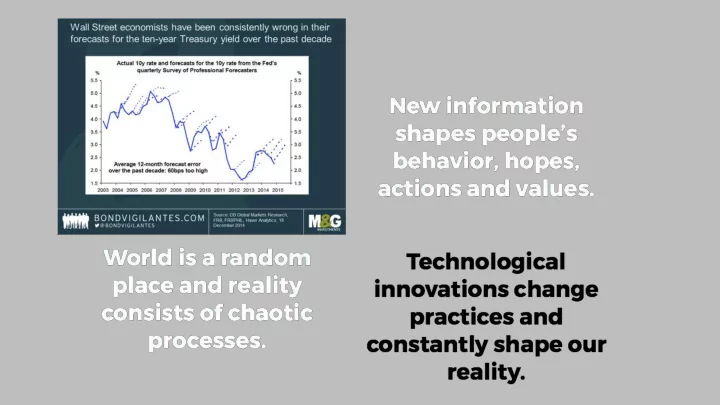

The word ’foresight’ was mentioned for the first time in a BBC broadcast in 1932 by visionary author H.G Wells, who called for the establishment of ”Department and Professors of Foresight”.
Scenarios are … … attempts to explain a logical chain of events to show how events happen phase by phase from this day to the future (Eric Jantsch 1967) … chain of events that are based on assumptions, which are made to pay attention to causal processes and decision-making moments. (Herman Kahn 1967) … Chain of events or processes, where world, a nation or a system develops to a certain future state (Ian Miles 1986)
Good scenario Interesting Helps in decision-making Has New information Possible Objectively Psychologically Consistent Assumptions of the decisions can be explained Plausible Contains previous actors, actions, choices, backgrounds, connections, materials...
Alternatives in scenario themes I II III A B Identifying key variables C 1. D E F B 2. Starting from main uncertainties A -A -B 3. Beginning with the most interesting A B C plausible developments
Two approaches 1. Forecasting 2. Backcasting
Two approaches 1. Forecasting 2. Backcasting
1. Starting from the distant future makes you better at grasping time proportions. 2. Usually making a great leap forward requires a lot of un- learning, both individually and collectively. This means that you also start seeing new opportunities in things that used to be irrelevant to your business. 2050 2020 2040 2030 Read more: http://www.demoshelsinki.fi/en/2015/05/28/how-nokia-backcasted-its-way-out-of-a-dead-end-and-why-
WHAT FUTURES BRING TO PLANNING PROCESS? Business Define topics Democratic process Lifestyles Define norms & goals Innovations Planning New tools for change Define tools & measures promising practices, emerging regimes Futures, foresight Infrastructure
Recommend
More recommend